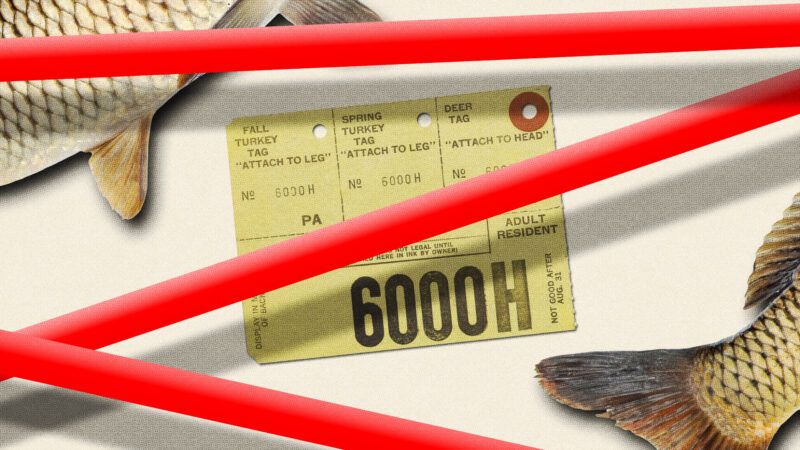Michigan Senate Proposes Onerous Licensing Rules for Hunting and Fishing Guides
Proponents say that the bills would ensure the quality of fishing and hunting guides, but occupational licensing doesn't tend to work that way.

Plenty of people enjoy hunting and fishing, but not everybody is a natural outdoorsman. To that end, a novice may want to hire a guide. A hunting guide can help aspiring sportsmen not only find the best places to hunt but also help pick the right equipment, obtain the necessary licenses, and even clean and process whatever they kill. Similarly, a fishing guide may know the best places to go depending on what fish you're trying to catch; they may also have a boat you can charter to go out onto the water, where they'll give you pointers on how to catch that prize-winning tarpon you have your eye on.
For any Michiganders hoping to get out and enjoy nature, that may soon become more difficult. Two bills currently before the Michigan Senate would impose new occupational licensing requirements on hunting or fishing guides.
If passed, guides working in either field would need to have both a driver's license and a hunting or fishing license (costing $150 every three years, or $300 for non-residents of the state); be certified in both CPR and first aid, and carry a fully-stocked first aid kit at all times; and have been convicted of no felonies, or certain misdemeanors, in the previous three years.
Guides must also file extensive reports with the state wildlife department, detailing how many clients they took out, where, and for how long, and what specific species of game they killed, plus "any additional information the department requires" pertaining to the animals' "biological characteristics." Hunting guides would file these reports annually, while fishing guides would have to file monthly; even in months when fishing guides did not work, they would have to file a report stating that they hadn't taken anybody out.
The Congressional Sportsmen's Foundation, a nonprofit that advocates for legislation favorable to fishing and hunting, supports the bills, saying they would "create the regulatory framework needed to ensure the quality of commercial guiding in the state."
But that's not how occupational licensing tends to work in practice. In 2022, the Institute for Justice (I.J.) examined customer reviews for several commonly licensed professions, such as manicurists, barbers, and tree trimmers. Comparing states with more onerous licensure requirements to states with milder regulations, the report found "no evidence that licensing raises quality and some evidence that it can reduce it."
And yet, even though licensure does not guarantee quality, the cost and effort required to obtain a license can be prohibitive. A 2018 report from the Brookings Institution found that "licensing imposes substantial costs: consumers pay higher prices, economic opportunity is reduced for unlicensed workers, and even those who successfully obtain licenses must pay upfront costs and face limited geographic mobility."
Not to mention, those requirements can fall more heavily on certain groups. According to a 2015 report by the National Reentry Resource Center (NRRC), there are "an estimated 32,000 laws specific to occupational licensing and business licenses that include provisions regarding the consideration of criminal records." And "more than one-third of those documented occupational and business license laws include automatic exclusions, such as blanket bans on applicants with any type of a felony conviction."
The NRRC report noted, "access to employment is a critical component of" an incarcerated person's reentry into society, and "studies that have examined recidivism have found that most repeat arrests occur within three years of the first conviction, and that after four to seven years, the risk of recidivism is greatly reduced." So even though the Michigan bills would only prevent licenses for those convicted in the previous three years, those three years are critical for a person to establish a support network that will help prevent them from reoffending.
According to a 2023 study from the Archbridge Institute, Michigan ranks No. 29 on the list of states with the most burdensome licensing regulations. It ranked third out of the five states in its geographic region, coming in far ahead of Illinois and Indiana, which had the 45th and 48th most burdensome regulations, respectively.
But as Jarrett Skorup, vice president for marketing and communications at the Michigan-based Mackinac Center for Public Policy, noted, the new bills "would establish regulations in Michigan far stricter than those of any other neighboring or Midwestern state. Ohio, Minnesota, Iowa and Wisconsin either have no regulations at all or only require outfitters to pay fees or register if they wish to work in certain waters. There is no mandatory CPR certification or required training, testing or reporting." Even Illinois and Indiana, more burdensome overall, do not require as much of their guides as the Michigan bills would.
"Alaska, Montana and Wyoming have the most similar licensing requirements to the ones being proposed in Michigan," Skorup notes. "But there's an important distinction: Their regulations cover hunting big game in remote wilderness areas. SBs 103 and 104, on the other hand, would require licenses for activity that thousands of other hunters and fishers can legally do on their own."


Show Comments (17)